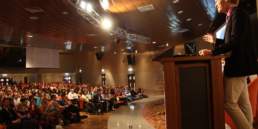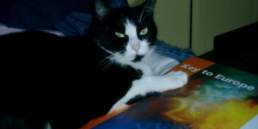AEGEE-Eskisehir is not an ordinary antenna. It is not only driven by passion and enthusiasm about the values and ideas of AEGEE; it is also a very serious and structured antenna. This could be seen best at the local Agora last weekend. It lasted two days and more intense than many Agoras of AEGEE-Europe. It may actually be the only two-day local Agora in the whole network. The members of the antenna, which has about 130 members, were also a lot better dressed than at the European Agoras. One of the visitors was AEGEE-Eskisehir founder Onur Metin. The Golden Times asked him about his impressions of the local Agora. And how he founded the antenna 13 years ago.
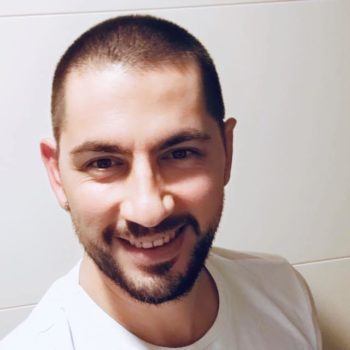
GT: Onur, you just visited the local Agora of AEGEE-Eskisehir. What did you do there?
Onur Metin: I’ve founded a new association called Domino Development Association in Eskisehir and I am still living in Izmir, I needed to come here for a meeting. The time frame was flexible so I decided to come here on the date of the local Agora of AEGEE-Eskisehir. I looked up to the latest statute articles and proposed some changes. Apart from that I’ve shared my experiences when asked for, asked questions to the current actives and next term candidates, met old friends and had the privilege to meet new ones.
GT: How does it feel to see your baby alive and kicking after so many years?
Onur: It is one of the few things that give me inspiration to do more with my life and dreams. Whenever I come here I still see the same integrity in the core operations of the local. I see people who believe in the values of this organisation. It doesn’t matter how much they do or what they achieve, what matters is, how much they believe in where they are and what they do. Of course goals, actions and results are important, but the real strength of the association are the values and growing culture around them.
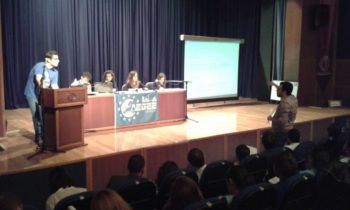
GT: Your enthusiasm is amazing…
Onur: I am proud of each and every person who supported this organization until today and will be supporting it in the future. I haven’t met maybe more than half of them but I respect them and love them all for everything they have done and tried to do for AEGEE. To me they’re no different than family.
GT: The local Agora looked very serious: with a stage and chair table it looked like a big Agora. Did you introduce it?
Onur: There are some improvements, but it is more or less the same since we’ve founded the antenna. We were founders from two or three different NGOs, so we focused a lot on organizational structure, both because of our past experiences and the wish of creating a self-sustaining antenna.
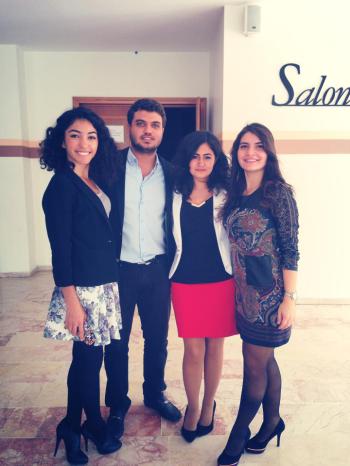
GT: Why did people look better dressed than AEGEE-Delft at the Agora of AEGEE-Europe?
Onur (smiles): I remember many people with orange ties from AEGEE-Delft mostly at the front rows at the Agoras I attended. I assume that it is a part of their antenna culture, because it is similar for us. The programme of the local Agora is very special to us. It includes the evaluation of a whole year and the presentation of plans for the next one, budgets, projects, working group reports, audit reports, candidatures, and questions related to them plus many other things. It is also a great platform to start learning about the organization. That is why there are usually two planned AEGEE promotions in the city, at the beginning of the first semester. One of them is right before the local Agora and the next one is two or three weeks after it, which is right before the Autumn LTC.
GT: Why does your local Agoras last two days? Do you have so much to discuss or are the discussions so heated?
Onur (smiles): I can say that the long and heated discussions are already there. But it is more than that. In our local Agora, we take inclusion seriously. We have the board, working groups, local Members Commission and Juridical Commission, project teams, new members, active members and alumni. It is sort of a gathering for all of us to learn about the things that happened in the past year and the plans for the coming term.
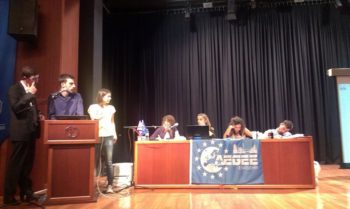
GT: Impressive. How does the two-day agenda look like?
Onur: The first day starts with the commission members taking the signatures of active members and alumni, followed by the selection of the chair, vice chair and secretaries; after that next we have discussions and votings for the proposed statutory changes; after that in order: presentation of the annual activity report, including all bodies like board, working groups and project groups, the presentation of the annual budget report, the presentation of the commission reports plus questions and answers for all these presentations, voting and result presentations of the annual reports, presentation of the proposal for the next term Year Plan and the finally a Q&A for a daily evaluation.
GT: It’s interesting that you preserve a terminology that changed at the European Agora, like Year Plan and Members Commission. What’s on the agenda of the second day?
Onur: The next day starts either with a postponed session from the previous day due to the high number of questions; or directly with the project proposals, questions and voting of the proposals for the next term. This is followed by the presentation of the budget, with Q&A and voting. Then there is the presentation of candidatures for the board, commissions and the board president – and Q&A, voting and election results. Finally there is a closing session where members can state their wishes for the future of the antenna. Of course there are lunch and coffee breaks in all these days. Oh and we breathe every now and then!
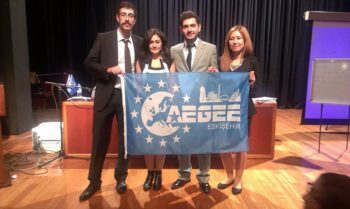
GT: What do you think about the new board and their future plans?
Onur: I really like that there is gender equality in the board. I think it is very crucial, since the gender difference can create different approaches for actions and solutions. They are all quite positive people with good heart and high hopes about the future of the organization. The previous board always leaves a Year Plan, a budget for the next term plus a three year strategic plan. The new board, which took over the responsibility this past weekend will go through these plans which the local Agora fine-tuned and approved; they will do some revisions if necessary. Apart from that, they have to follow the allowed spending in the operational budget; unless they do not raise some money for instance trough some project funds. Besides these, they have some ideas for their own roles which all can be summed up in strengthening the foundation of AEGEE-Eskisehir so that more people can be involved in our organization.
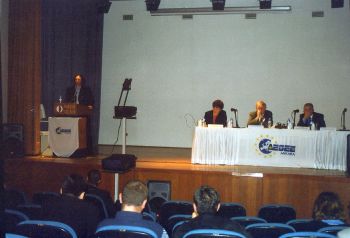
GT: Let’s go back 13 years. How did you hear about AEGEE for the first time?
Onur: When I was working in AIESEC we had an intern who was a Romanian but living and studying in Greece. His name is Ovidiu and he came to work in Eskişehir for the Turkish Education Volunteers Foundation. We became good friends and right before the end of his internship, I’ve seen an AEGEE Address Book in his room. I asked about it and that was the time I learned about AEGEE in brief. That is why when signing the Convention d’Adhésion, I was wearing a green T-shirt, which he gave me when he was in Eskisehir. It was a shirt with a Greek flag on the back which had two doves on it with olive leaves in their beaks, representing peace.
GT: So how did you found AEGEE-Eskisehir?
Onur (smiles): This is a long story, but also an interesting one! Some time after I learned about AEGEE, I saw an A4 sheet on the announcement board of the Congress Center; it was written Socrates Program and AEGEE presentation. I think it was March 2001. Some active AEGEE-Ankara members – Emrah, Hakan, Dijan, Buke – came to Anadolu University for a Socrates presentation – today’s Erasmus+ Programme used to be called like that. There I met Emrah’s brother Burak, his friends Murat and Didem and we started together. Apart from dealing with the requirements for founding a local, such as ten founding members, English and Turkish statutes plus a short and long term plan proposal, we were already looking for an office and organizing meetings to spread the word of the foundation.
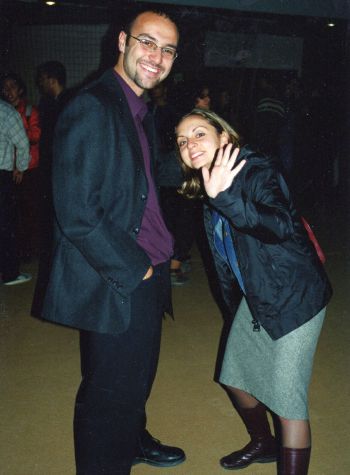
GT: You definitely did not waste any time!
Onur: Before and after the Agora in Ankara, which took place in autumn 2001, we went to the AEGEE-Ankara office and the EU representation several times to learn more about AEGEE and the EU. We were also in the Regional Meeting in Kusadasi; there we met our Network Commissioner Matina Magkou, AEGEE-Europe President Karina Häuslmeier and many other members. It was also crucial for our learning. One of the reasons of our strong foundation were the AEGEE-Ankara actives and oldies that helped us. We cannot thank especially enough to Metin Turan, Refet Saban, Hakan Gümüs, Emrah Kurt and Dijan Albayrak for their support. Also Matina, the Juridical Commission and the CD played a very important role both before and after we became an antenna.
GT: How do you remember the signing of the Convention d’Adhesion at Agora Ankara 2001?
Onur: During the Fall Agora in November 2001, we showed a short video about our foundation motivation. I still remember Burak saying: “Finish it Fast, We’re Running out of Tape” when recording my speech and signing of the Convention d’Adhésion… Both at that time and during our first local Agora, we were very excited and proud, because we worked together, we worked hard and shared a lot of good experiences.
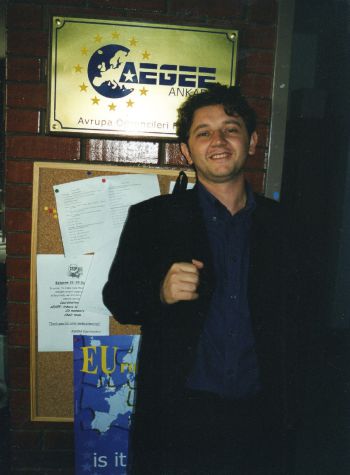
GT: Was it hard to find members or to get support?
Onur: Finding members and getting support was not hard, because we were determined about what we wanted to do and we had amazing people around us from the very beginning. Plus, we had already NGO experience so we already had a network of several stakeholders.
GT: What was your motivation to found an AEGEE antenna?
Onur: The four main pillars, the structure of the network, mission, vision and values became our motivation for the foundation and the things we wanted to do after that. There was nothing in all these that we didn’t truly believe in. Of course meeting all the people from all around Europe, sharing more or less the same values was also an important support to carry that motivation further, apart from seeing the immediate results of the things we’ve done at that time.
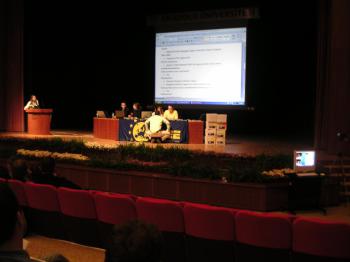
GT: 13 years later, how much do you follow what is going on in the antenna?
Onur: In several ways. We founded the association in 2001; since then several online tools – particularly Facebook and Google+ software – made both the communication and delivery of information easier. We have mailing lists and Facebook groups for both members and alumni. AEGEE-Eskisehir also organizes several social gatherings for all, including at least one event annually for AEGEE-Eskisehir Alumni. Beside these, I am trying to attend local Agoras as well as the annual Local Training Courses in Autumn and Spring whenever I have time. I made sure that anyone from the antenna can call me for whatever they need to ask or share. But of course it is not only me. Considering that we are already 13 years old, we have a lot of other alumni who are in touch with the active members or supporting them whenever they can.
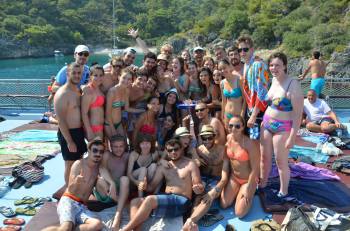
GT: You are also give lectures at the LTCs?
Onur: Yes. They usually call me prior to the event. Mostly for LTCs that are organized twice a year, AEGEE+ trainings – AEGEE in details – once a year and other annual events like IT Schools. By the way, most of these events are open to the locals in Turkey for the past nine years. I try my best to come, but sometimes when I have a too heavy workload or I am out of the country, I cannot attend. There were two events in particular that I really wanted to attend but I was not able to. One of them was the Agora 2007 in Eskisehir. I was not able to leave work so I sent a letter to be read for the opening. The other one was the 10th anniversary; at that time I was working in India so I sent a video with a voice recording about the history of AEGEE-Eskisehir and some photos to back them up.
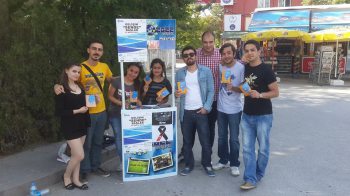
GT: How do you see the future of your antenna?
Onur: We wrote “Acting for a Shared Future” below the logo in the foundation video that we showed at the Fall Agora 2001 in Ankara. It was part of our vision that can be translated as: we believe in what we do and we believe in the beauty of living peacefully under the same roof so we’re here and ready to support that ideal. I think all founders still share the same belief that members, who share our organizational values, have great potential to support and add to those ideals. Creating change is something that requires vision, commitment and patience. In AEGEE-Eskisehir we believe that we create positive changes every day. We are not naive to believe that the world is all sunshine and rainbows, but we believe that we are an important part of that “ocean of drops” where we spread our values, where we work for a shared future with passion, for each other and for the others as much as we can, to support the expansion of that ocean. So as long the new members of the antenna keep that passion, I see a lot of those positive change stories reaching to us as history – no matter how far we are.
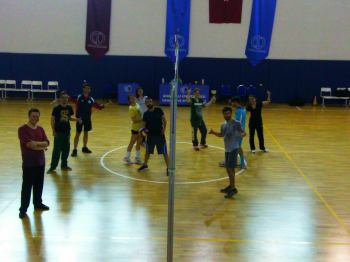
GT: Finally a personal question: what do you do for a living today?
Onur: I am currently working as a free-lance trainer and project consultant for private and nongovernmental sectors. I travel a lot. I’ve started doing this one and a half years ago, previously I was living and working in Mumbai as an HR Generalist in Tata Consultancy Services. After my experience in India I decided to do what I love most and what I am passionate about. It was hard but from where I stand, the track looks amazing even if I still see several obstacles on it. I can easily say that my experience in AEGEE was at the top of the things that have influenced my decision and the spirit of that experience still whispers to my ear to ask questions and to do more about my life.
Related Posts
1st August 2019
The Gallery of All Presidents of AEGEE-Europe
Here is the gallery of all Presidents of AEGEE-Europe - with photos of every one of them. Enjoy the list!

